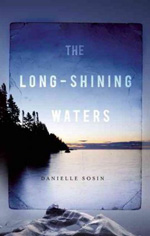
Lake Superior in North America, which extends into both Canada and the United States, is arguably the largest freshwater lake in the world. For generations it has fascinated, frightened and served those who have visited its waters, among them Indians, explorers, trappers, hunters, missionaries, businessmen, fisherman, tourists and ordinary men and women. Many writers of both poetry and prose have taken it as their subject, and Danielle Sosin has distinguished herself in this regard. Her story brings us an intimate picture of the lake and three people who understand its power through their lives:
• In 1902, Berit lives peacefully with her fisherman husband Gunnar on the shores of the lake. A Norwegian couple, they relish their hardworking existence, its relative isolation, and the challenge of bending the New World to their will. In time, each one must gaze with understanding into the lake's tragic depths.
• In 2000, Nora has spent her life alongside the lake, for many years running a popular neighborhood bar in the midst of a community she knows and loves, but avoiding the waters that give it life. When she loses the simple routine of her existence on one pivotal night, the lake helps her redefine it.
Although each story is told separately through discrete chapters, they seep into each other in subtle and transformative ways. Sosin moves the reader smoothly back and forth through time, allowing the discovery of each life through beautifully adept third person prose narration. Poetic passages interspersed between narratives offer a fourth voice, that of the natural world, the only true constant on the journey. At its heart, this book—like many great stories—tells about the discovery of self through the events of a world that is wonderful and terrible, a world that takes as readily as it gives.
It is said that the Inuit people have hundreds of words for snow. Although this is untrue, it would not be inaccurate to say that Sosin has hundreds of words for lake. The breadth of her language for characterizing this world and its powers is quite simply astonishing. Through her words, we hear the heartbeat of both people and waters, and come away just as visitors to the lake have done for millennia—in awe and understanding.

Milkweed Editions, hardcover, 9781571310835
